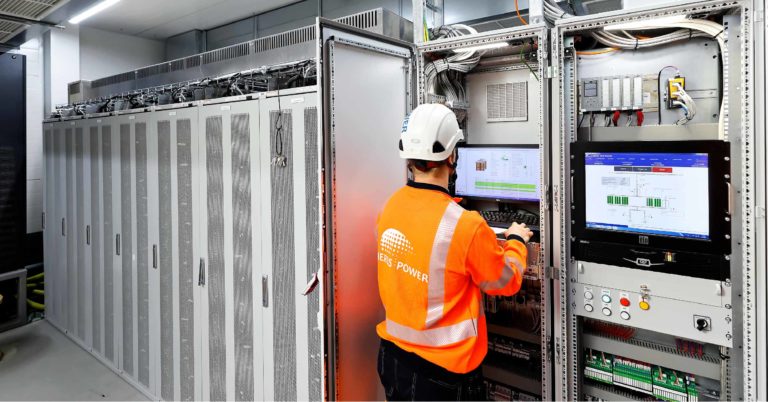
Grid stabilization with battery energy storage system
Battery energy storage has emerged as a key technology for supporting the transition to a greener future. As renewable energy sources like solar and wind power become more common, energy storage becomes increasingly important for stabilizing the electricity grid. In this blog post, we will explore the role of battery energy storage in supporting grid stability and how it helps to ensure a reliable and sustainable energy supply.
The need for grid stability with the green transition
Renewable energy sources like solar and wind power are intermittent, meaning that they only generate electricity when the sun is shining, or the wind is blowing. This variability can make it difficult to balance the grid and maintain a stable supply of energy. The grid must be balanced in real-time to ensure that the frequency and voltage remain within safe limits. This is where battery energy storage systems come in.
Battery energy storage and grid stability
Battery energy storage systems can help support grid stability by providing a fast response time in the frequency control market. Frequency is the measure of the speed at which alternating current (AC) changes direction, and it must be kept within a narrow range of 50 or 60 Hertz to ensure the stability of the grid. If the frequency deviates from this range, it can cause blackouts and damage to equipment.
Merus Power’s battery energy storage system – Merus® ESS – can respond very quickly to changes in frequency, making it ideal for providing frequency regulation services. When there is excess energy in the grid, the battery can be charged. When there is a shortage of energy, the battery can be discharged, providing power to the grid, and helping to maintain the frequency within safe limits. This helps to ensure that the grid remains stable and reliable, even as the share of renewable energy sources increases.

Merus® ESS – Energy storage system
Merus® Energy Storage System is a scalable lithium-ion battery energy storage system fully designed by Merus Power.
The importance of battery energy storage in the green transition
Battery energy storage is also important for ensuring a reliable energy supply when there is no sun or wind. By storing excess energy during periods of high generation, batteries can provide power to the grid during periods of low generation. This helps to ensure that there is always a reliable supply of energy available, regardless of the weather conditions.
In addition, battery energy storage can help to reduce the need for fossil fuel-powered peaking power plants (peakers). These plants are used to meet periods of high demand and can be polluting and expensive. By providing energy storage, batteries can help to reduce the need for peaker plants, making the grid cleaner and more efficient.
And the conclusion?
Battery energy storage technology is critical for supporting the green transition and ensuring a reliable and sustainable energy supply. By providing fast response times in the frequency control market, Merus® ESS can help maintain grid stability and reduce the need for fossil fuel-powered peaking power plants. As the share of renewable energy sources continues to grow, battery energy storage systems will play an increasingly important role in ensuring a clean and reliable future.

Mikko Marttala
Director,
System Deliveries and Services